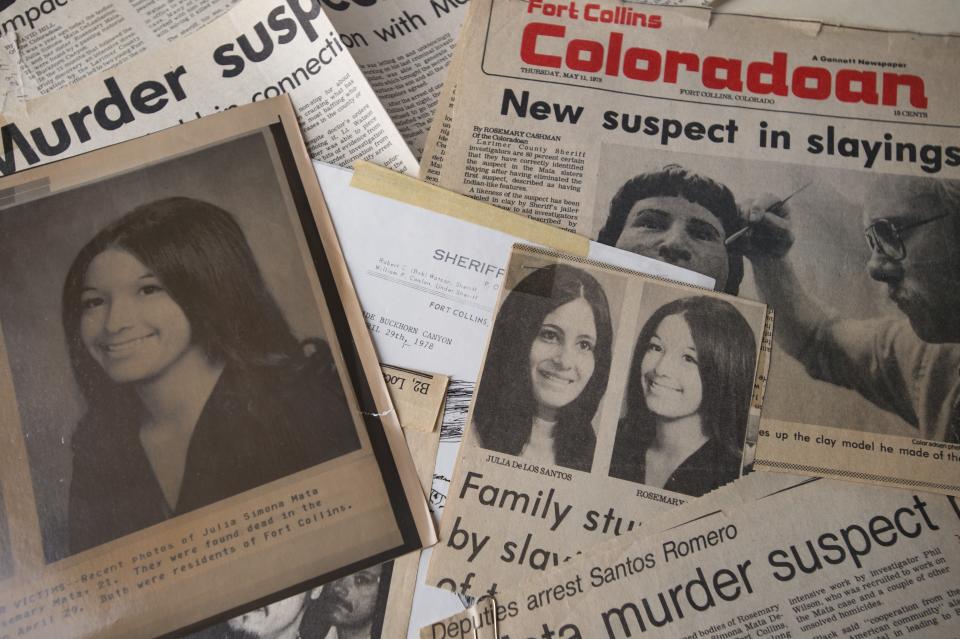Evidence in Larimer County's 1978 Mata murders tested for DNA after case reopens
Editor's note: This story has been updated with additional comment from District Attorney Gordon McLaughlin.
Editor's note: Santos Romero's status conference was moved from Nov. 8 to Nov. 16. This story has been changed to reflect that.
Evidence in the decades-old double homicide of two Fort Collins sisters has been tested for DNA with possibly more tests in the works — marking a major step in the reopened case against the man convicted in their killings.
Results from the testing of at least three unnamed pieces of evidence are expected to be ready to discuss by Wednesday, Nov. 16, when 68-year-old Santos Romero Jr. is due back in court in Larimer County for a status conference.
Romero was convicted of killing Rosemary Mata, 21, and Julia Mata DeLosSantos, 24, and has been serving two life sentences in the 1978 murder case — once billed by the Coloradoan as one of "the most drawn-out and highly emotional cases in Larimer County history."
Inside the Mata murdersRevisit our 2018 investigation into the polarizing Larimer County case
The sisters, who were last seen outside the Northern Hotel's dance club in the early hours of April 29, 1978, were found beaten to death on a rural roadside up Buckhorn Canyon later that morning.
In statements made to local law enforcement in 1978 and 1979 — including some under hypnosis — Romero's accounts over the years ranged from him saying he saw his brother and friend leave with the Mata sisters that night to saying he had memories of washing blood off of his hands in the creek along Buckhorn Road and, at one point, killing the sisters himself.
Romero was found guilty on two counts of first-degree murder and one count of conspiracy to commit sexual assault in early 1982.
Romero has since claimed his innocence and successfully appealed his conviction in 1985, asserting that he had expressed doubts prior to undergoing hypnotic interviews with local law enforcement in 1978 and 1979. But his successful appeal was overturned by the Colorado Supreme Court two years later.
In 2019, Romero filed a motion for post-conviction relief, alleging ineffective assistance of trial counsel. His case was reopened that September, court records show.
Earlier this year, Romero's defense team and the Larimer County District Attorney's Office agreed to retest three items for DNA but didn't specify which items. During a status conference Aug. 30, Romero's attorney, Jim Merson, told the court that while some testing has been done on the evidence, the DA's office wants to retest it in a consumptive way, meaning the evidence could not be tested again after the tests are performed.
Merson later told the Coloradoan he thinks they will move forward with the consumptive testing. He declined to answer specific questions about the testing, deferring comment until all of it has been completed.
In court Tuesday, Deputy District Attorney Joshua Ritter told Judge Susan Blanco the DA's office and Romero's attorneys will work to decide how and when that consumptive testing should be done, with results expected in the coming weeks.
Testing evidence for DNA in this case has been suggested since at least 2008, when Fort Collins man Tim Masters was exonerated in the 1987 murder of Peggy Hettrick using advances in DNA testing.
More:Unlikely friendship forms between Tim Masters and the detective who interrogated him

In an Associated Press article from that year, then Larimer County District Attorney Larry Abrahamson said he reviewed 36 cases where DNA evidence could help the defendants. When asked if Romero's case had been reviewed, Abrahamson's office said no, saying Romero admitted to the act.
When asked about the possibility of DNA testing for a 2018 podcast and story on Rosemary's and Julia's murders, DA office spokesperson Jodi Lacey said Romero hadn't filed any motions requesting DNA testing since Abrahamson's 2008 review and that exhibits from his trial were destroyed in 2010.
Lacey declined to comment on the trial exhibits' destruction and any current testing when the Coloradoan inquired early this year, citing the case being reopened and its pending litigation as a reason.
In a statement shared with The Coloradoan via email on Aug. 31, District Attorney Gordon McLaughlin said: "We take conviction review very seriously and intend to take every reasonable measure to ensure the integrity of the case. We have worked with defense counsel to test remaining items and will continue to review relevant information and evidence in the interest of fairness to the defendant while respecting the victim's family's need for closure on this tragic case."
Coloradoan reporter Sady Swanson contributed to this report.
Listen to our previous podcast series on the Mata murders
This article originally appeared on Fort Collins Coloradoan: Evidence in Larimer County's 1978 Mata murders tested for DNA
